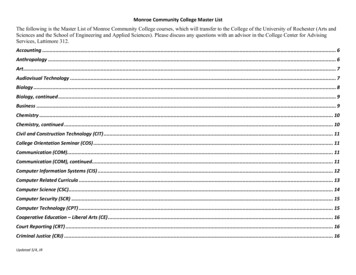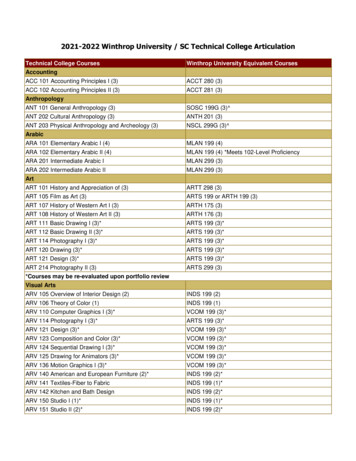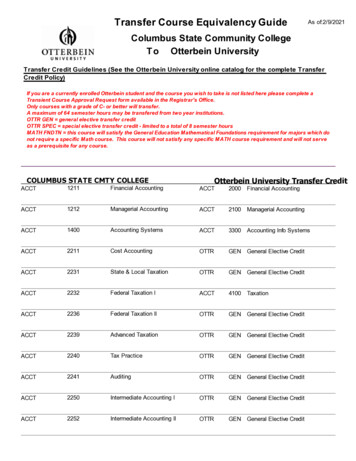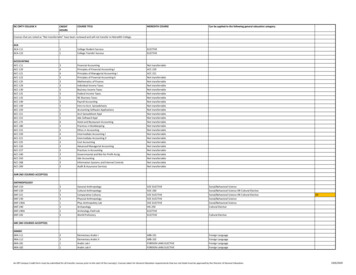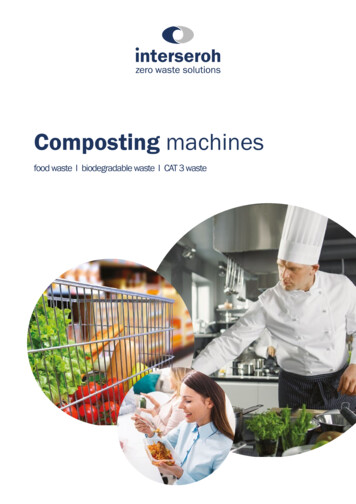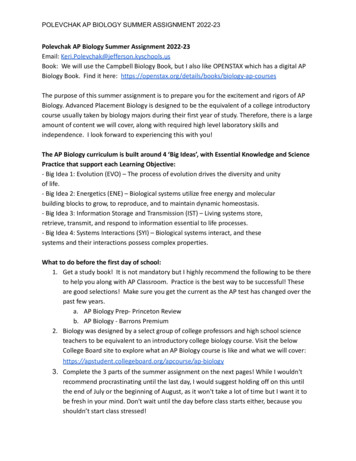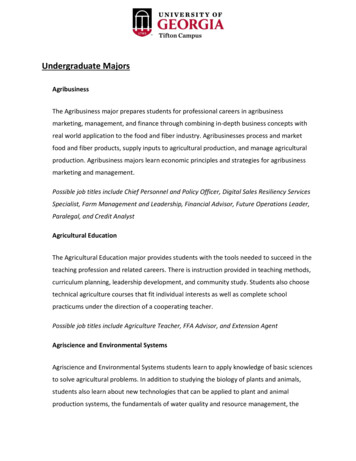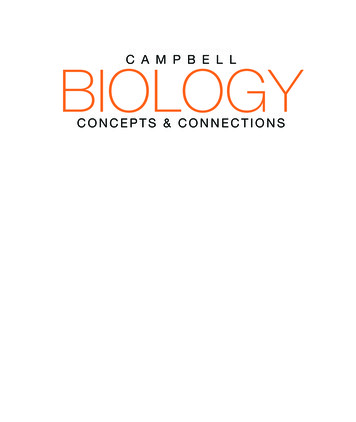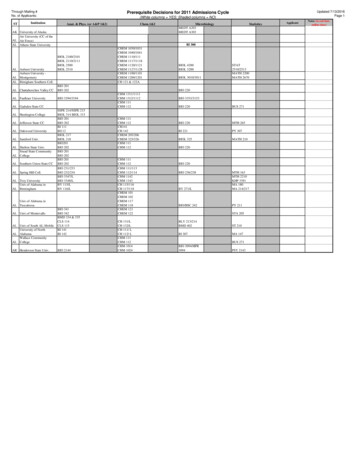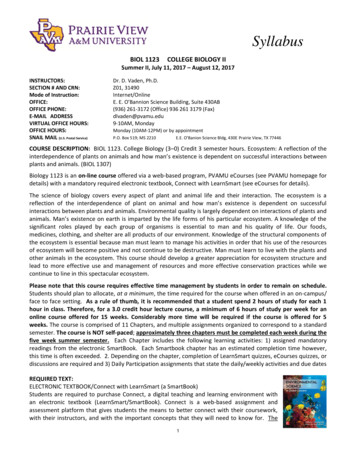
Transcription
SyllabusBIOL 1123COLLEGE BIOLOGY IISummer II, July 11, 2017 – August 12, 2017INSTRUCTORS:SECTION # AND CRN:Mode of Instruction:OFFICE:OFFICE PHONE:E-MAIL ADDRESSVIRTUAL OFFICE HOURS:OFFICE HOURS:SNAIL MAIL (U.S. Postal Service)Dr. D. Vaden, Ph.D.Z01, 31490Internet/OnlineE. E. O’Bannion Science Building, Suite 430AB(936) 261-3172 (Office) 936 261 3179 (Fax)dlvaden@pvamu.edu9-10AM, MondayMonday (10AM-12PM) or by appointmentP.O. Box 519; MS 2210E.E. O’Banion Science Bldg, 430E Prairie View, TX 77446COURSE DESCRIPTION: BIOL 1123. College Biology (3–0) Credit 3 semester hours. Ecosystem: A reflection of theinterdependence of plants on animals and how man’s existence is dependent on successful interactions betweenplants and animals. (BIOL 1307)Biology 1123 is an on-line course offered via a web-based program, PVAMU eCourses (see PVAMU homepage fordetails) with a mandatory required electronic textbook, Connect with LearnSmart (see eCourses for details).The science of biology covers every aspect of plant and animal life and their interaction. The ecosystem is areflection of the interdependence of plant on animal and how man’s existence is dependent on successfulinteractions between plants and animals. Environmental quality is largely dependent on interactions of plants andanimals. Man’s existence on earth is imparted by the life forms of his particular ecosystem. A knowledge of thesignificant roles played by each group of organisms is essential to man and his quality of life. Our foods,medicines, clothing, and shelter are all products of our environment. Knowledge of the structural components ofthe ecosystem is essential because man must learn to manage his activities in order that his use of the resourcesof ecosystem will become positive and not continue to be destructive. Man must learn to live with the plants andother animals in the ecosystem. This course should develop a greater appreciation for ecosystem structure andlead to more effective use and management of resources and more effective conservation practices while wecontinue to line in this spectacular ecosystem.Please note that this course requires effective time management by students in order to remain on schedule.Students should plan to allocate, at a minimum, the time required for the course when offered in an on-campus/face to face setting. As a rule of thumb, it is recommended that a student spend 2 hours of study for each 1hour in class. Therefore, for a 3.0 credit hour lecture course, a minimum of 6 hours of study per week for anonline course offered for 15 weeks. Considerably more time will be required if the course is offered for 5weeks. The course is comprised of 11 Chapters, and multiple assignments organized to correspond to a standardsemester. The course is NOT self-paced; approximately three chapters must be completed each week during thefive week summer semester. Each Chapter includes the following learning activities: 1) assigned mandatoryreadings from the electronic SmartBook. Each Smartbook chapter has an estimated completion time however,this time is often exceeded. 2. Depending on the chapter, completion of LearnSmart quizzes, eCourses quizzes, ordiscussions are required and 3) Daily Participation assignments that state the daily/weekly activities and due datesREQUIRED TEXT:ELECTRONIC TEXTBOOK/Connect with LearnSmart (a SmartBook)Students are required to purchase Connect, a digital teaching and learning environment withan electronic textbook (LearnSmart/SmartBook). Connect is a web-based assignment andassessment platform that gives students the means to better connect with their coursework,with their instructors, and with the important concepts that they will need to know for. The1
LearnSmart/SmartBook is the only book required for this course. The LearnSmart is an adaptive readingexperience designed to transform the way students read. It creates a personalized reading experience thatfocuses on content based on a student’s understanding and evaluates students’ knowledge in real time to adaptthe course textbook.Electronic Textbook: Connect with LearnSmart Online Access for Environmental Science: A Global Concern, 14thEditionAuthor(s): William Cunningham, Mary CunninghamPublisher: McGraw-Hill Higher EducationISBN: ISBN10: 1259911535 ISBN13: 9781259911538 ( 85.00 for 6 months from McGraw Hill, also available inPVAMU bookstore, cost more)Section web address: 1123-z01*courtesy access (free access) available for 14 days****see eCourses for link to site and information about access codeHow SmartBook WorksEach chapter in the SmartBook contains four stages, Preview, Read, Practice and Recharge:1) Preview - You start with a preview of each chapter that familiarizes you with key learning objectives.Previewing establishes a framework of the material in your brain, which helps you retain knowledge over time.2) Read - While reading, you are guided to focus on core topics where you should spend the most time studying.3) Practice - As you read the material, SmartBook also presents you with questions to help identify what contentyou know and don't know.4) Recharge - To ensure concept mastery and retention, you must Recharge in order to review the importantmaterial you're likely to forgetSupplementary Learning MaterialsThe SmartBook is the only book required for this course. However, students can purchase additionalsupplemental text content materials if they so desire. Students are strongly encouraged to read the textbook andif supplementary resources are needed, the library has an enormous amount of material.Access to Learning Resources:PVAMU Library: phone: (936) 261-1500; web: http://www.pvamu/.edu/library/University Bookstore: phone: (936) 261-1990; web: https://www.bkstr.com/Home/10001-10734-1?demoKey dCOURSE GOALS:1. Become familiar with the basic concepts, language and practices of environmental science.2. Develop a greater appreciation for ecosystem structure.3. Understand how more effective use and management of resources and more effective conservation practicesbenefits the ecosystem.4. Understand and explore the impact of humans on the environment, resources, pollution, the ecosystem, etc.,including current events.STUDENT LEARNING OUTCOMESUpon successful completion of this course, students will be able to:12345Describe fundamental ecosystem concepts and discuss current issues impactingenvironmental science.Apply critical thinking skills to scientific inquiryAnalyze and interpret empirical and quantitative biological dataDemonstrate the ability to effectively communicate the fundamentals of biology ina written reportDemonstrate the ability to engage in productive teamwork2ProgramLearningOutcome #AlignmentCore CurriculumOutcomeAlignmentCritical ThinkingCritical ThinkingEmpirical andQuantitative SkillsCommunicationTeamwork
MAJOR COURSE REQUIREMENTSBIOL 1123 is a web-assisted course; LearnSmart modules and Chapter Quizzes are implemented and constitute60% of the total grade. Discussions are designed to clarify concepts. Students will read assigned material beforediscussion in order to participate.COURSE EVALUATION METHODS:This course will utilize the following instruments to determine student grades and proficiency of the learningoutcomes for the course.Exams – There will be two exams designed to measure scientific knowledge of presented course material andapplication of critical thinking, empirical and quantitative skills.Online Class AssignmentsClass assignments are designed to supplement and reinforce course material by using critical thinking andwritten communication skills. Class assignments will also incorporate the analysis and interpretation ofempirical and quantitative data. For group activities (Discussion Forums), students will work in small groups todemonstrate productive teamwork by exhibiting the ability to work effectively with others to support ashared goal and consider different points of view.Web-based Quizzes and LearnSmart modules – regular web based activities designed to measure abilityto apply critical thinking, empirical and quantitative skills to presented course material. There will be twentyweb-based activities given during the semester. These will consist of a combination of objectives anddiscussion items. The web –based activities schedule (availability and due dates) will be available in theecourse calendar.SmartBook – Weekly assigned readings.LearnSmart assignments launch directly into the assignment chapter and are integrated with SmartBook.LearnSmart is an adaptive learning tool that maximizes productivity and identifies the most importantlearning objectives for each student to master at a given point in time.Written AssignmentsInitial Essay - Initial Narrative Essay: Goals and Expectations for the On-line Biology Course. In the essay,your student profile should give relevance information that may influence your progress in this course (priorcourse work, have you taken a biology course before, extracurricular activities, hobbies, jobs, personaldifficulties, etc.) Describe the learning techniques that you have used successfully, and what you know aboutthe on-line biology course. Indicate which of the topics is of greatest interest to you and why. Discuss why youchose to take this course, how you will define successful completion of the class, and how to achieve it.Address any concerns you may have about the class.Written Report – Students will demonstrate written communication and critical thinking skills by writing aReport. Students will find one recent article about a subject related to the material in this course from the aspecifically stated student journal. The article must cover a topic that is related to the subject matter of BIOL1123. Students will search for articles using key vocabulary from the class lectures and assignments. Thereport will be graded on the appropriateness of the topic, content, organization, tone, sentence structure,word choice, writing mechanics, conclusion, reference quality, citation format and length of the report. Thegrading rubric, criteria for selection of article, and other important details about the report will be availableon the BIOL 1123 eCourses site at a later date.Method of Determining Final Course GradeGrading MatrixGrades will be determined by performance on a regular basis. Your grade will be based on a total of 100 points.Course grades are determined from total point accumulation at the end of the semester, as follows:Class AssignmentsWeekly Web-based Activities- LearnSmart Modules- Chapter Quizzes- eCourses QuizzesCommunication45 pts.(45%)15 pts (15%)3
- 4 Asynchronous communications/Teamwork (Group) ActivitiesExams & Written Assignments2 Exams (midterm & final)1 Initial Essay1 Written ReportParticipation 17 Weekly Participation Assignments (eCourses participation assignments will be available each week,Every Monday, Wednesday and FridayTotal35 pts.(35%)5 pts (5%)100 pts.(100%)GRADING SCALE 90-100 A; 80-89 B; 70-79 C; 60-69 D; Below 60 FAccessing the Gradebook -Students may access their grades by clicking on the “My Grades” tab located in the lefthand navigation bar.Tentative Class Schedule (see eCourses for details)BIOL 1123 will cover sixteen chapters: Chapter 1 UNDERSTANDING OUR ENVIRONMENT, Chapter 2 PRINCIPLES OF SCIENCE AND SYSTEMS, Chapter 3MATTER, ENERGY, AND LIFE, Chapter 4 EVOLUTION, BIOLOGICAL COMMUNITIES, AND SPECIES INTERACTIONS, Chapter 5 BIOMES: GLOBAL PATTERNS OFLIFE, Chapter 7 HUMAN POPULATIONS, Chapter 8 ENVIRONMENTAL HEALTH AND TOXICOLOGY, Chapter 15 AIR, WEATHER, AND CLIMATE, Chapter 16 AIRPOLLUTION, Chapter 17 WATER USE AND MANAGEMENT, Chapter 18 WATER POLLUTION, Chapter 19 CONVENTIONAL ENERGY, Chapter 20 SUSTAINABLEENERGY, Chapter 21 SOLID, TOXIC, AND HAZARDOUS WASTE, Chapter 24 ENVIRONMENTAL POLICY, LAW, AND PLANNING, AND Chapter 25 WHAT THENSHALL WE DO?COMMUNICATIONStudents can communicate with the instructor via the My Mail (email function in eCourses).All communications must be in standard English. Your instructor will not read or respond to abbreviated communications in“text message” format.All electronic mail communication related to this course will utilize the My Mail tab. To communicate by e-mail within thecourse with other participants or all participants, click the Mail tab link on the left and click Create Message to send amessage. Students are able to send messages to All Users or Select Users in the course, including the instructor. Be sure tocheck only the recipients that you want to receive the E-mail.Your instructor will hold a “virtual” office hour on Tuesdays, 1-2PM. During these times I will respond to email inquiries aswell as to postings on the discussion blogs. Students will receive timely responses to any email sent during normal businesshours (i.e., 8 am to 5:00 pm) during the work week (i.e., Monday through Friday). Any e-mail sent at other times will beaddressed during the next regular work day. Should I be out of the office, an unavailable to students, for any reason I willpost an announcement so that students may plan accordingly.“Discussion” forums are required for the course. These discussions are provided expressly to facilitate addressing student’squestions and to stimulate discussion involving the content covered in each lesson. Students may communicate with theinstructor and with one another via the discussion forum feature in eCourses, which is an online discussion forum in whichstudents and faculty can communicate asynchronously (i.e., at any time) via message postings. Since postings areasynchronous, others will post responses after your postings.COURSE PROCEDUREThis section of Biology 1123 is a three semester credit hour lecture a 5 week on-line course. The course activities aredesigned to reinforce the textbook materials and to enhance the understanding of scientific concepts.The student should:1.Read assigned electronic textbook chapters during the assigned time interval.2.Complete LearnSmart modules and eCourses quizzes during the assigned time interval. .3.View eCourses Homepage on regular basis (at least three times a week (suggested check: Monday, Wednesday, andFriday).4.Complete eCourses participation on a weekly basis.5.Respond to relevant questions during discussion forum (asynchronous and synchronous communications) during theassigned time interval.4
University and Course Rules and Procedures1. COURSE WORKStudents MUST take the scheduled quiz or examination within the 24-hour period on the dates indicated. In the on-linedelivery format, THERE IS NO OPPORTUNITY FOR MAKE-UP QUIZZES OR EXAMINATIONS unless official excuse is provided.All assignments MUST be submitted by the established deadline. Assignments submitted within 24 hours of theestablished deadline will be subject to a significant penalty in points. Submissions made more than 24 hours after theestablished deadline will not be accepted. There is no “extra credit” work available, nor are exceptions or extensions toestablished schedules and policies except in the case of medical emergency documented with the Dean of Student Affairs.Examinations There are two major exams will be given during the semester. Exam questions will be multiple choice. Donot schedule any activity during the final exam period in this class. There will be no excused absences or makeup for thefinal exam. The final exam is not cumulative. MAKE-UP EXAMS: Students are strongly advised to take all exams at thescheduled time. Plan and schedule your activities so that you can be present to take all exams at the scheduled time.Students with non-valid or non-official excuses for missing an exam will earn a grade of zero (0) for the missed exam.Students may request a make-up exam for one that was missed. However, the instructor will schedule the time and placeof the make-up exam which will not interrupt the teaching of the class or delay the complete coverage of the coursetopics.2. STUDENT CLASS ATTENDANCE POLICY: The University Attendance Policy requires students to be present for eachscheduled class or schedule online assignments. Students are responsible for materials covered during their absences.Online class assignments will start at the prescribed time and end at the prescribed time. Failure to complete onlineassignments are accumulated beginning with the first day of class. The University catalog provides more detailedinformation.3. ACADEMIC MISCONDUCT: (Students caught cheating will receive a grade of F for the course. Students are prohibitedfrom participation in acts of academic dishonesty, including tampering with records or falsifying admissions or otherinformation. Disciplinary action will be taken against any student who alone or with others engages in any act of academicfraud or deceit. The undergraduate catalog provides more detailed information. It is the responsibility of students andfaculty members to maintain academic integrity at the University by refusing to participate in or tolerate academicdishonesty. Reports must be the work of the individual student. Evidence of copying your work from others, including theworld wide net, is cheating. Students should read the section on Offenses and Appropriate Disciplinary Actions in thecurrent PVAMU website catalog.Forms of academic dishonesty:Cheating: deception in which a student misrepresents that he/she has mastered information on an academic exercise that he/shehas not mastered; giving or receiving aid unauthorized by the instructor on assignments or examinations.Academic misconduct: tampering with grades or taking part in obtaining or distributing any part of a scheduled test.Fabrication: use of invented information or falsified research.Plagiarism: unacknowledged quotation and/or paraphrase of someone else’s words, ideas, or data as one’s own in worksubmitted for credit. Failure to identify information or essays from the Internet and submitting them as one’s own work alsoconstitutes plagiarism.4.5.6.7.NONACADEMIC MISCONDUCT (See Student Handbook): The University respects the rights of instructors to teach andstudents to learn. Maintenance of these rights requires campus conditions that do not impede their exercise. Campusbehavior that interferes with either (1) the instructor’s ability to conduct the class, (2) the inability of other students toprofit from the instructional program, or (3) campus behavior that interferes with the rights of others will not betolerated. An individual engaging in such disruptive behavior may be subject to disciplinary action. Such incidents will beadjudicated by the Dean of Students under nonacademic procedures.SEXUAL MISCONDUCT (See Student Handbook): Sexual harassment of students and employers at Prairie View A&MUniversity is unacceptable and will not be tolerated. Any member of the university community violating this policy will besubject to disciplinary action.DISABILITIES: The office of Disability Services is located in Evans Hall, room 315 or call (936) 261-3585. This office isresponsible for achieving and maintaining program accessibility for all students who self-identify as having an officiallydocumented disability (Rehabilitation Act, Section 504 and Americans with Disability Act)If you have a disability, pleaseinform me so that I can assist you to get “reasonable accommodation” related to the disability. ADA Statement: Studentswith disabilities who believe they may need adjustment in this class are encouraged to contact the Office of DisabilitiesServices at (936) 261-3585 as soon as possible. Once you receive a letter of adjustment from the office, please make anappointment with instructor to discuss adjustments for this class.STUDENT ACADEMIC APPEALS PROCESS: Authority and responsibility for assigning grades to students rest with thefaculty. However, in those instances where students believe that miscommunication, errors, or unfairness of any kindmay have adversely affected the instructor’s assessment of their academic performance, the student has a right to appeal5
by the procedure listed in the Undergraduate Catalog and by doing so within thirty days of receiving the grade orexperiencing any other problematic academic event that prompted the complaint. All challenges or recalculations of finalcourse grades must be documented by the student with appropriate paperwork, and must be brought to the attention ofthe instructor within the first week following completion of the course. Quiz and examination grades must be contestedwithin the first week following administration of the quiz or examination. After these deadlines, changes will not beconsidered. Course Time Limits: This is a semester-based course and you must complete all course requirements withinthe semester that you are enrolled. It is important to schedule your course study to fit into your academic plan. Be awaremany instructors are not on campus during the holidays or term breaks, which can delay the return of correctedassignments. Therefore, if you have important deadlines to meet such as graduation, be sure to complete and submit allof your assignments and take the final examination as scheduled. It is your responsibility to ensure the credits for thiscourse will apply toward graduation or certification deadlines.TaskstreamTaskstream is a tool that Prairie View A&M University uses for assessment purposes. At least one of your assignments isREQUIRED to be submitted as an "artifact,” an item of coursework that serves as evidence that course objectives are met.More information will be provided during the semester, but for general information, you can visit Taskstream via the link ineCourses.Technical Considerations for Online and Web-Assisted CoursesMinimum Hardware and Software Requirements:-Pentium with Windows 7 or PowerMac with OS 10.7 or later-Ethernet or wireless connection to the Internet-Internet provider with SLIP or PPP Broadband service-2GB RAM-Hard drive with 40MB available space-17” monitor, 1024x768, color or 16 bit-Sound card w/speakers-Microphone and recording software-Keyboard & mouse-Netscape Communicator ver. 4.61 or Microsoft Internet Explorer ver. 9.0 /plug-ins or Mozilla, Foxfire, Google Chrome-Plug-ins- Flash 11 - Java SE6, SE7- Quicktime 7.7 Java: Version 1.5 or higherMedia Player: Flash 9 or higherAdobe Reader Version 7 or above-Participants should have a basic proficiency of the following computer skills:·Sending and receiving email·A working knowledge of the Internet·Proficiency in Microsoft office Suite·Proficiency in the Acrobat PDF Reader·Basic knowledge of Windows or Mac O.SX.Netiquette (online etiquette): students are expected to participate in all discussions and virtual classroom chats whendirected to do so. Students are to be respectful and courteous to others in the discussions. Foul or abusive language will notbe tolerated. When referring to information from books, websites or articles, please use APA standards to reference sources.Students in traditional classes may not need to participate in online discussions.Technical Support: Students should call the Prairie View A&M University Helpdesk at 936-261-2525 for technical issues withaccessing your online course. The helpdesk is available 24 hours a day/7 days a week. For other technical questions regardingyour online course, call the Office of Distance Learning at 936-261-3290 or 936-261-3282Communication Expectations and Standards:All emails or discussion postings will receive a response from the instructor within 48 hours.You can send email anytime that is convenient to you, but instructor checks email messages throughout the work-week(Monday through Friday). Instructor will respond to email messages during the work-week by the close of business (5:00 pm)on the day following receipt of them. Emails received on Friday will be responded to by the close of business on the followingMonday.6
Submission of Assignments (may not be required for traditional courses):Assignments, Papers, Exercises, and Projects will distributed and submitted through your online course. Directions foraccessing your online course will be provided. Additional assistance can be obtained from the Office of Distance Learning.Discussion Requirement for online courses:There will be no required face to face meetings on campus (online courses only). However, we will participate inconversations about the readings, lectures, materials, and other aspects of the course in a true seminar fashion. We willaccomplish this by use of the discussion board.Students are required to log-on to the course website often to participate in discussion. It is strongly advised that you checkthe discussion area daily to keep abreast of discussions. When a topic is posted, everyone is required to participate. The exactuse of discussion will be determined by the instructor.It is strongly suggested that students type their discussion postings in a word processing application and save it to their PC ora removable drive before posting to the discussion board. This is important for two reasons: 1) If for some reason yourdiscussion responses are lost in your online course, you will have another copy; 2) Grammatical errors can be greatlyminimized by the use of the spell-and-grammar check functions in word processing applications. Once the post(s) have beentyped and corrected in the word processing application, it should be copied and pasted to the discussion boardAcademic Calendar – Summer II 2017Jun 08Late Deadline to Apply for Summer 2017graduationThursdayJun 08Late Deadline for Graduating UndergraduateStudents to Submit Application for Tuition Rebatefor Summer 2017ThursdayJul 17Withdrawal from Course(s) with Academic Record(“W”) BeginsMondayJul 3115th Class DayMondayJul 3160% of TermMondayAug 04Withdrawal from Course(s) with Academic Record(“W”) EndsFridayJul 04Independence Day (University Closed)TuesdayJul 05 Jul 10Regular RegistrationWednesday through MondayJul 11First Class Day (2nd 5-Week Session)TuesdayAug 10Last Class Day (Second Summer Session Ends)ThursdayJul 11Late Registration and Drop/AddTuesdayAug 10Last Day to Withdraw from the University (from AllCourses) for the Summer 2017 semesterThursdayJul 11Late Registration, Add Courses, ChangeMajor/Certification or any Matriculation ChangeEnds – Web Registration Access ClosedTuesdayAug 11Final ExaminationFridayAug 12CommencementSaturdayJul 14Census DateFridayJul 14Last Day to Withdraw from Course(s) withoutAcademic RecordFriday7
Biology 1123 is an on-line course offered via a web-based program, PVAMU eCourses (see PVAMU homepage for details) with a mandatory required electronic textbook, Connect with LearnSmart (see eCourses for details). The science of biology covers every aspect of plant
